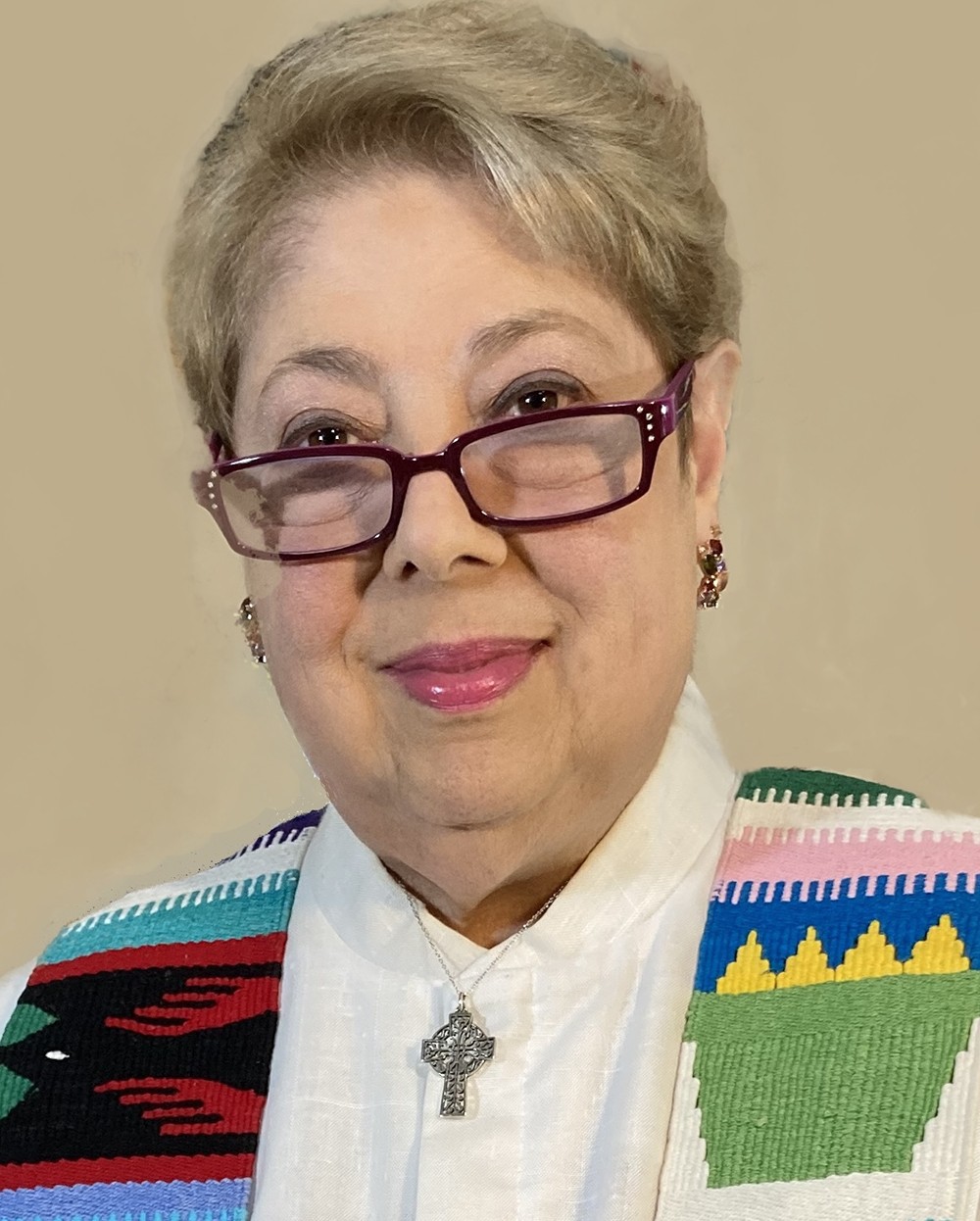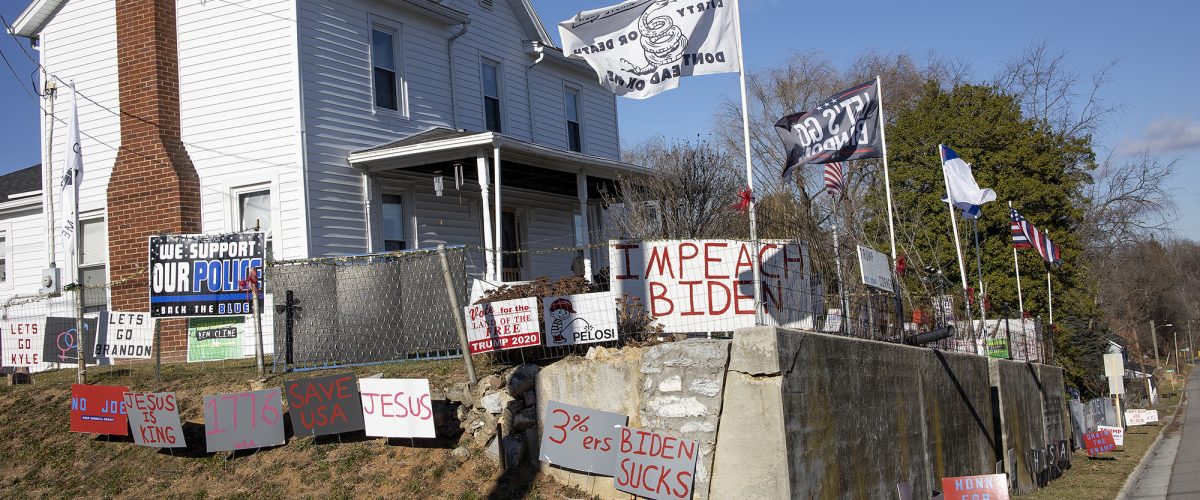Have you ever been death tripping?
Journalist Jeff Sharlet recently took an unusual trip through the rural roads of Wisconsin. His trip became much more than a run-of-the-mill ride through the countryside. Instead, his trip was more like a pilgrim’s journey with a solemn purpose. He called it “Death Tripping.”
Sharlet’s pilgrimage included knocking on the doors of houses along the way. He did not approach just any houses, only the houses that displayed the deadliest American symbols and flags, including guns, ammunitions, coffins, lynching ropes, profane handwritten signs, banners and billboards, and manifestos that explore distressing modern philosophies of a civil war to come.

Kathy Manis Findley
I read Sharlet’s article two days after watching the video of the beating and murder of Tyre Nichols. The disturbing video, along with reading about Sharlet’s trip across Wisconsin, proved to be “TMI” for me — too much information with the power to wound my spirit.
But in these days, these are the images we must see, the information we must ponder, the realities we must consider. These are the realities of our society and of our world. As citizens and Christians, we cannot help but feel high levels of anxiety about the state of the world we inhabit.
It is clear the state of our own lives and communities is also deeply troubling. Our modus operandi, and a good one, is to pray, not only for the catastrophes we understand, but also for the suffering we cannot understand. And after praying, we obsess about what we can do about it.
We might not want to read the recent headlines:
- “In just the first few weeks of 2023, at least 69 people have been killed in mass shootings across the country.”
- “At least 3 dead in 4th California mass shooting this month — as the state mourns the loss of at least 19 people in three separate shootings last week.”
- “Harrowing videos show police fatally beat Tyre Nichols, who cries out for his mother.”
There are many more headlines. We could read them all day, every day. What adds to our distress is that we not only read the headlines, we see them and hear them. In reading and re-reading the story of the death tripping journalist, I can only say that Jeff Sharlet’s story brought me to despair because he described real thoughts and beliefs held by real people who live in communities in Wisconsin’s rural countryside.
Megan and Rob Brumm
Rob Brumm, a militiaman, and his wife, Megan, were all too eager to talk about their lives. Rob revealed he is head of a militia group of about 6,400, and that there were many other militia groups in Wisconsin, all preparing for a civil war. Megan and Rob were joined by their teen daughter, Athena, and their three-year-old. Guns and ammunition were spread out on a big table, so the conversation focused on hoarding weapons and being prepared for battle.
“Were you at the Capitol building on January 6?”
“Yes, I was there.”
“Were you armed?”
“Classified!”
Rob continued, “Everybody shoots, even the little one.”
The number of guns between them? That information, Rob also called “classified.” He also said daughter Athena was the best shot of all the militiamen and women. “She was holding this Taurus Raging Bull .480 Ruger when she was two and a half,” said her proud father.
Mary’s grief
Mary told her story to Sharlet. He wrote, “She had been in the doctor’s stirrups when the Roe ruling came down. She wanted a baby, and she and her husband had chosen the process of reproductive technology. After a course of fertility drugs, Mary now possessed three mature eggs. The nurse stepped out to consult the doctor. The doctor entered the examination room. ‘I can’t recommend you continue,’ the doctor said. Three eggs meant a risk of multiples. Mary could handle twins. Triplets she could not. Not her finances and not her body. If she went forward, there was a chance that all three eggs could be fertilized. One embryo might have to be removed. And that, as of 9:11 a.m. Central Time, June 24, in Wisconsin, could be a felony.”
“In Wisconsin, a woman bled for more than 10 days from an incomplete miscarriage after emergency room staff would not remove the fetal tissue…”
—The Washington Post, July 16, 2022
Even the teenagers shared strong feelings
A group of highly intellectual and informed teens shared a conversation. “Eavesdropping” on their thoughts was enlightening, to say the least. The conversation turned to civil war. Or, as Theta, the eldest, put it, revolution.
“It’s not that I’m like, ‘Ooh, yeah, war,’” Theta said. “It’s like, we need a different system. As soon as possible. Because the planet is literally dying.”
Her friend Paige claimed she knew how the revolution would occur.
“I have a hot take on how it’ll start,” Paige said. “It’s unfortunate, but I feel the revolution won’t start until something happens that affects white men. Like BLM, that came close.” They all agreed that the murder of George Floyd and the demonstrations of Black Lives Matter had opened eyes to the state of things. Paige said: “Their demonstrations didn’t cause a long-lasting national movement because it’s about Black people. The fall of Roe probably isn’t going make an enormous impact either, because it’s about women. But when something happens to a white man?”
“Like they ban golf,” Karsen interjected. They all laughed.
“Yeah, They ban golf,” agreed Paige, “and that’s when the revolution starts.”
That kind of humor made this dark trip bearable. It was amazing that every person interviewed, although stalwart in their twisted convictions, had a sense of humor that made them approachable and even friendly. There may be a lesson here since many of us discern a person’s beliefs and then immediately decide we can’t like them.
Then Jerry spoke
“We are well-supplied.” Jerry announced. “We can defend ourselves.” As the conversation went on, the anger kept moving and twisting between this group of friends — Rob and Peggy and Jerry and James. Of them, Sharlet observes this: “Abortion and guns and God and whiteness and women and cities and borders and then guns again. Such is the intersectionalism of fascism. All perceived threats, across all time — Indian wars and new Cold War and Critical Race Theory — are brutally interconnected.”
In Sharlet’s article, we see humor. We witness interaction among neighbors who hold opposing ideas. We see acceptance of one another in spite of personal convictions, politics, religion and other divisions. We see courage for those willing to stand up for their convictions. And I believe we see hope. We see the hope of teenagers and militiamen, child-bearing couples and old men protecting their land.
“I’m ready to be a mom,” said Mary. “I’m making that choice.”
In fact, all of them are making difficult choices, but they are also going forward because “that’s all there is — hoping for life, for freedoms lost, and for freedoms yet to be found in this strange new land.”
Our revolution
Most of my friends never would serve in a militia. Most of the people I know don’t have a weapons arsenal in their basements. They don’t entertain revolutionary ideas like being a part of a civil war or rushing into the United States Capitol armed with bats and guns and profane signs.
But would it not become a kind of revolution if my friends and I claimed the power of our voices to speak for justice every time justice was being diminished?
Would that we might find ourselves among the courageous who hold deep convictions, who are willing to stand for them, who are opening their hearts to love and justice, who are leaning into hope, even while they are “death tripping” on this precarious, but inevitable, journey. After all, the journey of justice and love and hope — that’s God’s journey, and God already has invited us to travel it.
Kathy Manis Findley is an ordained Baptist minister with Greek Orthodox roots. Now retired in Macon, Ga., she spent her 38-year ministry serving as a pastor, hospital chaplain, trauma counselor and missionary to Uganda. She is a graduate of Southern Baptist Theological Seminary and is certified in victimology, trauma intervention and child forensic interviewing. She is the author of two serious books, Voices of our Sisters and The Survivor’s Voice: Healing the Invisible Wounds of Violence and Abuse, and just for fun, one Kindle novel.
Related articles:
The church must show the world a more excellent way of nonviolence | Opinion by Rodney Kennedy
Living into lament: A white response to the killing of Tyre Nichols by police | Opinion by Robert P. Jones


